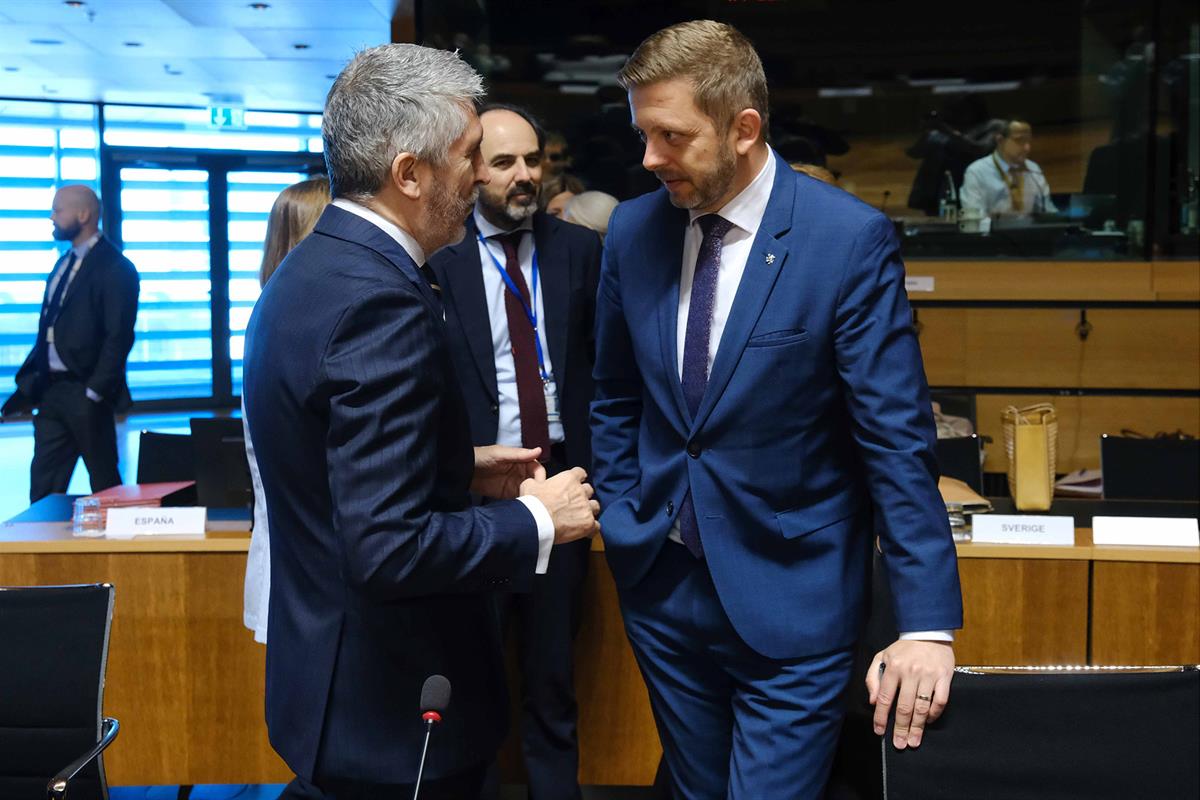Grande-Marlaska calls for "flexibility" from the EU to make the implementation of the migration pact a "shared European success"
News - 2024.6.13
 The Minister for Home Affairs, Fernando Grande-Marlaska, during the EU Council of Home Affairs Ministers, held in Luxembourg
The Minister for Home Affairs, Fernando Grande-Marlaska, during the EU Council of Home Affairs Ministers, held in Luxembourg
The Minister for Home Affairs, Fernando Grande-Marlaska, has asked the EU for "sufficient flexibility" to design the national plans that will adapt the European migration pact to each country, which should be fully in force in two years, as of 11 June 2026.
"The political agreement reached in December was a historic success and now we must continue working to ensure that its implementation is also a common European success," said the minister during his participation in the Council of Home Affairs Ministers held this Thursday in Luxembourg, where the Commissioner for Home Affairs, Ylva Johansson, presented the Implementation Plan of the European Pact on Migration and Asylum to the 27 member states.
Grande-Marlaska supported the European Commission's proposal and expressed his confidence that the new implementation phase will continue "the dynamic of mutual trust" between the member states that presided over the final phase of negotiation of the migration pact, which took place during the Spanish Presidency of the EU in the second half of 2023.
The minister stressed the importance of reinforcing two "essential pillars" of migration policy "which are transversal to the pact", and which Spain has always defended in Brussels, namely cooperation with the countries of origin and transit of migration and "ambitious financing". In his opinion, "there is an urgent need for funding that is consistent with the needs of EU migration and asylum policy. Without sufficient funding, the pact will not be effective.
EU crisis prevention and response
Grande-Marlaska also spoke in the debate on the EU's response to global crises, highlighting the "key importance" of the EU Civil Protection Mechanism, "which has been doing extraordinary work" in crisis management "for decades". "We must take care of the mechanism, ensuring a level of resources and funding adequate to future risks, including those arising from climate change," he added.
Among the most recent crises, the European response to Russia's invasion of Ukraine was addressed. The European Commission has proposed to extend the temporary protection granted to Ukrainian citizens for another year, and to extend its validity until March 2026. The Minister for Home Affairs welcomed the proposal "with satisfaction", recalling that Spain has granted temporary protection to more than 207,000 displaced persons, making it the fourth European country in terms of the number of applications.
Ahead of the Council, a working meeting on terrorism was held in Luxembourg to discuss the Gaza conflict on EU security. Grande-Marlaska advocated continuing to work on the removal of terrorist content on the Internet to minimise the effects of violent radicalisation. So far during 2024, Spain has issued 43 orders for the removal of terrorist content.
Within the framework of the Council, Grande-Marlaska also held bilateral meetings with the Swiss Federal Councillor for Justice and Police, Beat Jans, and with the Swedish Minister for Justice, Gunnar Strömmer.
Non official translation




